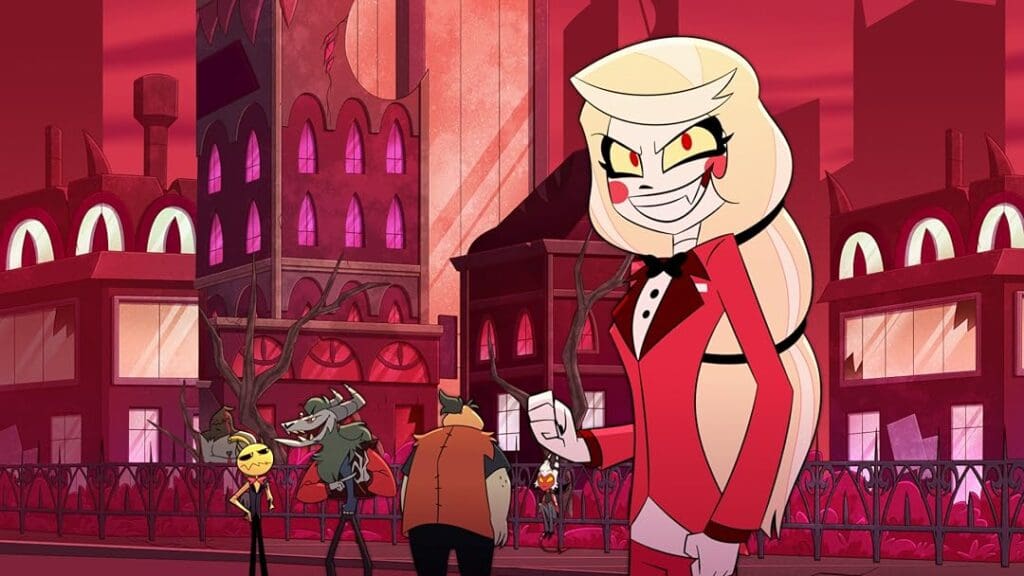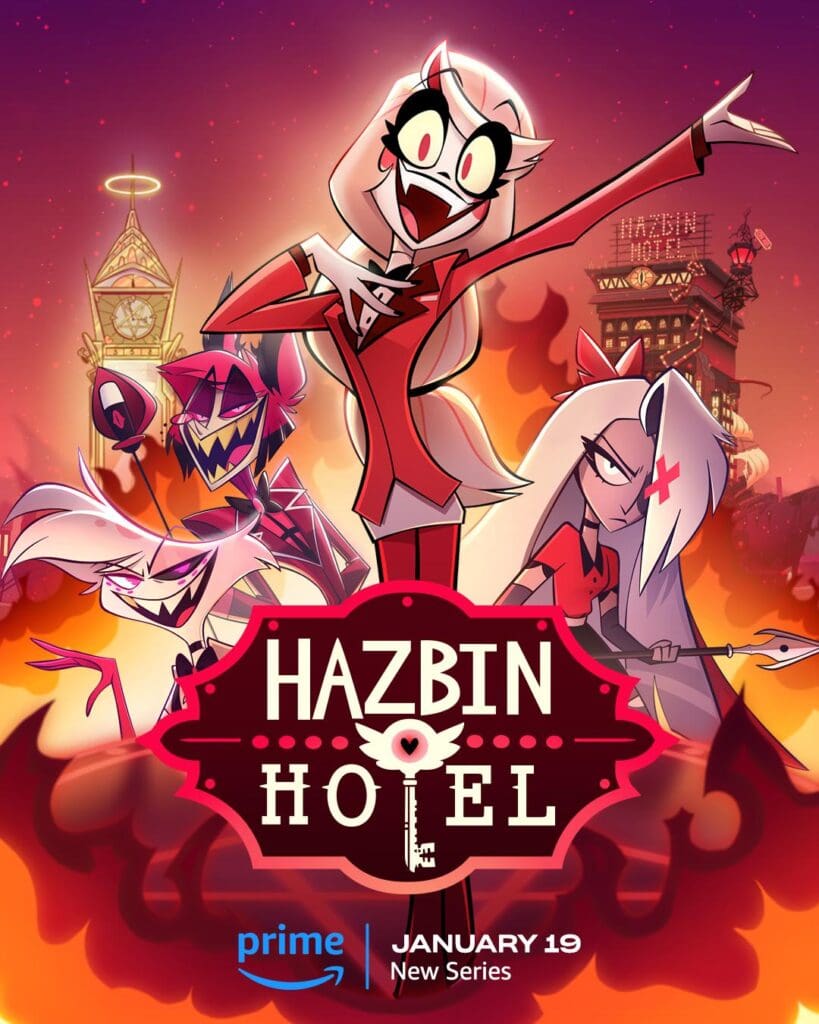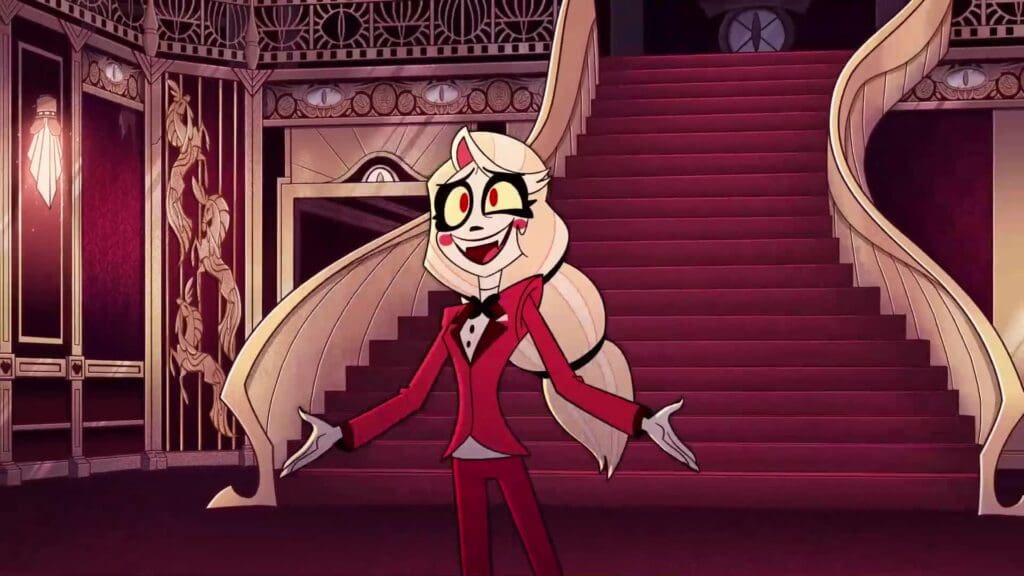
You’ve likely heard the phrase “character assassination,” but sadly, what’s become far too common in this modern culture of cringe is “character castration.” Hazbin Hotel is the devilish brainchild of the one and only Vivienne Medrano, or as she’s better known on YouTube, Vivziepop. The show’s pilot was released in 2019 and was eventually picked up by the studio A24, and its first episode made its long-awaited debut on January 18th, 2024. Okay, enough with the boring stuff, let’s get to the drama.
Hazbin Hotel was thankfully set in Hell, so I was already sitting in the proper place as my eyes scraped across the introduction of episode one like splintery wood. What made it so bad, exactly?
The show’s premise surrounds Princess Charlotte Morningstar, daughter of Lucifer and Lilith, as she opens the Hazbin Hotel, where souls can better themselves and seek redemption. This, however, isn’t the problem. The problem is Lucifer’s horrific castration.

Metaphorically, of course, but here’s what I mean:
The introduction to the episode “Overture” begins with a retelling of Genesis and the creation of Hell. The original story depicts Lucifer as Heaven’s brightest son and a rebellious angel who succumbed to his pride and turned against Heaven. He was soon defeated and cast into Hell to pay for his betrayal. In short, he was, without a doubt, a villain. It’s not a requirement to keep Lucifer a complete villain, but Hazbin Hotel takes this to the extreme.
It’s clear that Hazbin Hotel wants to portray demons and devils in a more sympathetic light, which was made especially clear in Hazbin’s sister show Helluva Boss; however, giving the story the old JRPG twist isn’t quite the problem.
Lucifer, King of Hell, isn’t some sympathetic bad boy or even a brooding intellectual who might have good reason for standing against Heaven. And yes, Hazbin Hotel is one of those shows where angels are evil. Vivziepop is quite daring, isn’t she? What’s next? Is Lucifer a good guy? Well, the reality is far worse. They turn Lucifer, one of history’s greatest bad boys, into a timid, castrated soyboy.
As the introduction story goes, Heaven was ruled by angels who worshiped good and shielded all from evil. Lucifer is still king of Hell in this setting, but here’s how he’s described.

“Lucifer was one of the angels. He was a dreamer with fantastical ideas for all of creation, but he was seen as a troublemaker by the elders of Heaven for they felt his way of thinking was dangerous to the order of their world. So, he watched as the angels began to expand the universe in their ways.” – Overture, Hazbin Hotel
So Lucifer is no longer a rebel but an artistic soul held down by the stuffy elites. No longer is he the fallen angel who defied Heaven. Now he’s the fun-loving good boy who mildly annoyed Heaven. The timid man who just sadly sat by and “watched as the angels began to expand the universe in their ways.” And it’s here the main problem truly begins.
Hazbin Hotel is noted for its edgy humor, deluge of swear words, and constant sex jokes, and so has gained a kind of edgy reputation. But this is “safe” edge. Something that might anger one’s conservative parents but won’t get you into trouble. After all, all of these things are almost commonplace in adult-centric modern media. Try watching Family Guy or Vox Machina for more than five minutes. It’s kind of like learning curse words as a kid. It might feel scandalous, but you’re typically not giving us anything with substance. Hence, safe edgy.
Unfortunately, Vivziepop tends to avoid anything truly edgy like the plague, and this is where the true problem lies.

The rest of Lucifer’s story concerns his wife, Lilith, Adam’s first wife. Adam, though, demanded his wife submit to his demands, and Lilith refused. She left the garden, and Lucifer fell in love with her “fierce independence.”
The two offer the apple of knowledge to mankind to unlock free will, but this unleashes evil into the world. Lucifer and Lilith are banished to Hell as a result, and Lucifer, being the spineless weakening he is here, loses his will to dream and becomes the submissive house husband to his dominant wife. Again, character castration.
Now, the obvious retort is: This story is a blatant lie.
Surely, this is just a biased story Lilith created for her daughter, Charlotte. This was my initial cope as well. The creation story is so obviously biased that it can’t possibly be the real one.

This, unfortunately, is where Vivziepop’s desperate avoidance of anything truly edgy, by edgy, I mean morally complex, comes back into play. Adam, the first human, becomes an angel. He’s also an arrogant jerk…just like the story said. There is no nuance to his character as of Overture. To make matters worse, the angel oppressors from the book are also angel oppressors in real life. So far, the opening story seems fairly accurate. Even still, I would love for it to be false, and perhaps, under any other circumstance, it would be. However, I’m also drawn to Hazbin Hotel’s sister show, Hellavu Boss. This show is set in the same universe and centers around Blitzo the Imp and his assassination business. His team travels to the mortal realm to kill humans on behalf of demons willing to pay. The only way to the mortal realm is with a book Blitzo borrowed from Stolas, a powerful demon noble. The relationship between Blitzo and Stolas is one of sexual dominance. Blitzo may borrow Stolas’ book to enter the mortal realm at will, and in return, Blitzo must serve the demon lord’s every carnal desire. Things take a turn when we find out Stolas is trapped in a toxic marriage, and Blitzo is his only source of escape. Ah, a perfect setup for a nuanced and morally complex story. Stolas is taking advantage of someone weaker than him, but we can also see the desperation that drove him to this arrangement.
At the start, Stolas is domineering, vulgar, and crass towards Blitzo. He seems to revel in his power over the imp, treating him like an underling. Soon, however, Vivziepop’s horrific writing flaw rears its ugly head.
As the show progresses, the fans and even Vivzipop herself seem to become far more invested in Stolas. Suddenly, what could have been a morally complex and edgy situation finds itself written into oblivion. Stolas suddenly became a sad man trapped in an abusive marriage. Blitzo was his childhood friend all along, and he had a neglectful father. It’s no surprise since everything Vivziepop writes seems drenched in daddy issues. One probably wouldn’t be shocked to learn that once Stolas has been absolved of his sins, Blitzo, now a voluntary lover of Stolas rather than a forced one, became a submissive house husband to his wife.
Once Stolas is re-written as sympathetic, he falls neatly into the same situation as Lucifer. Vivzipop seems to be so repulsed by actual nuance and conflict that she tends to write her favorite characters without accountability. Stolas is no longer framed as taking advantage of a poor imp but is now a man looking to escape an abusive marriage. Blitzo isn’t taking advantage of a sad, desperate man. He simply gave that desperate man the attention and love he craved. With a wave of the magic pen, all toxicity, complexity, and nuance vanish. In short, Vivzipop has a habit of taking the edge off character and situations some might see as abusive while making most of the men we’re meant to sympathize with weak and submissive. Again, just like Lucifer from our opening story.

See, it isn’t ethics I’m concerned with, but story, narrative, and conflict. Was Stolas’ dominance over Blitzo ethical? Of course not. But it made for dire conflict for our main character, which became far more complex when we saw the abuse that drove Stolas to Blitzo. When Vivziepop begins to favor their connection, the writing tosses the conflict away and remakes it into something innocent.
So, is the opening story simply the biased ramblings of an unreliable narrator? I hope so. The past evidence, however, shows us that Vivziepop avoids conflict and true moral complexity in the characters she favors. Not to mention, the opening story was already proven right with Adam and the angels. The male characters she favors tend to be submissive or lack dominance. (note: not all, since characters like Alastor are exceptions.) There is a chance the storybook is false, but going by Vivziepop’s writing habits and what we’ve seen so far, it’s quite likely we’ve seen Lucifer added to the growing list of male characters who’ve suffered a horrific character castration.
Unless you count Netflix’s Sandman, then Lucifer was added a long time ago.
What do you think of Vivzipop’s Hazbin Hotel? Leave a comment and let us know.

Gnostic Heresy. It’s what’s for breakfast (in Hollywood, at least.)
Netflix delenda est.
At least Vox Machina is entertaining. This show, is just trying to paint Hell of all places as victims. That’s where I have a problem.
If VivziePop truly wanted to be edgy, then among her coterie of redeemable sinners there would be wife-beaters and mothers who trans their kids against their wills, slave-owners and race-hustlers, White supremacists and Black Israelites, Nazis, Commies, ACLUers, members of the John Birch Society and of the Anti-Defamation League, Hitler, Stalin, Tojo, Churchill, and FDR, and Harvey Milk and Matthew Shepherd. But the Vivzieverse is actually about as edgy as a fish-egg; it’s “Paradise Lost” as written by Tumblr. Even the look of it is pretty much an effeminate, watered-down version of Jhonen Vasquez, except painted over in gay colors (in both the old and new senses of that word). It’s very much the triumph of the interior decorator over animation, and its dime-store nihilism and narcissism make me want to vomit.